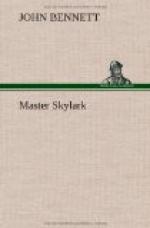“What! How? Thou wast her father but a moment since!”
“Nay, nay,” Goole stammered, turning a sickly hue; “her father’s nearest friend, I said,—he gave her in my charge.”
“My father’s friend!” cried Cicely. “Thou? Thou? His common groom! Why, he would not give my finger in thy charge.”
“He is the wiser daddy, then!” laughed Jemmy Armstrong, “for the fellow hath a T for Tyburn writ upon his face.”
The eyes of the bandy-legged man began to shift from side to side; but still he put a bold front on. “Stand off,” said he, and tried to thrust Tom Webster back. “Thou’lt pay the piper dear for this! The knave is a lying vagabond. He hath stolen this pack of goods.”
“Why, fie for shame!” cried Cicely, and stamped her little foot. “Nick doth not steal, and thou knowest it, Gregory Goole! It is thou who hast stolen my pretty clothes, and the wine from my father’s house!”
“Good, sweetheart!” quoth Tom Webster, eying the bandy-legged man with a curious snap in his honest eyes. “So the rascal hath stolen other things than thee? I thought that yellow bow of his was tied tremendous high! Why, mates, the dog is a branded rogue—that ribbon is tied through the hole in his ear!”
Gregory Goole made a dash through the throng where the press was least.
Thump! went Tommy Webster’s club, and a little puff of dust went up from Gregory’s purple cloak. But he was off so sharply, and dodged with such amazing skill, that most of the blows aimed at his head hummed through the empty air, or thwacked some stout apprentice in the ribs as they all went whooping after him. He was out of the press and away like a deer down a covert lane between two shops ere one could say, “Jack, Robin’s son,” and left the stout apprentices at every flying leap. So presently they all gave over the chase, and came back with the bag he had dropped as he ran; and were so well pleased with themselves for what they had done that they gave three cheers for all the Cloth-workers and Saddlers in London, and then three more for Cicely and Nick. They would no doubt have gone right on and given three for the bag likewise, being strongly in the humor of it; but “Hi, Tom Webster!” shouted one who could hardly speak for cherries and cheese and puffing, “what’s gone with the queen we’re to have so fast, and the toll that we’re to take?”
Tom Webster pulled at his yellow beard, for he saw that Cicely was no common child, and of gentler birth than they. “I do not think she’ll bide the toll,” said he, in half apology.
“What! is there anything to pay?” she asked with a rueful quaver in her voice. “Oh, Nick, there is to pay!”
“We have no money, sirs,” said Nick; “I be very sorry.”
“If my father were here,” said Cicely, “he would give thee a handful of silver; but I have not a penny to my name.” She looked up into Tom Webster’s face. “But, sir,” said she, and laid her hand upon his arm, “if ye care, I will kiss thee upon the cheek.”




